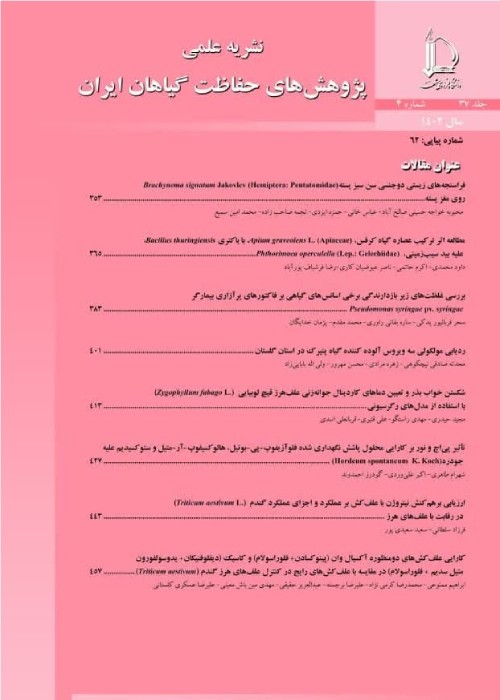Mutualistic Ants (Hymenoptera: Formicidae) Associated with Paracoccus ficus in Fig Orchards of Fars Province, Iran
Ants are the most ubiquitous insects on the earth with more than 12000 species which are classified into 21 subfamilies. Until now, more than 170 ant species have recorded in Iran. Mutualistic relationship between ants and scale insects have been reported in Iran. Such relationships between ants and insects are known as trophobiosis which is due to attraction of ants to honeydew of scale insects. Honeydew is a sugar-rich sticky liquid, secreted by aphids and some scale insects as they feed on plant sap. Ants provide protection from predators and parasitoids by building shelters around scale insect colonies. Such a relationship is mostly facultative and only a few taxa of mostly tropical or subtropical scale insects have obligate mutualism with ants. The coccoids with obligate mutualism display obvious behavioral and morphological adaptations for living with ants. Ants are also able to establish antagonistic interaction with honeydew-producing hemipterans and contribute positively to biological control by the suppression of pests.
In a study during 2013-2014, colonies of the mealybug Paracoccus ficus Moghaddam, 2014 were investigated for mutualistic ants feeding on honeydew of the mealybug in fig orchards of Neyriz, Estahban and Shiraz cities of Fars province, South Iran. Samples were collected by hand, forceps and soft brush. The specimens were preserved in 75% alcohol in small glass vials and were transferred to the laboratory. The morphological keys were used for identification. Specimens were deposited in Insect and Mite Collection of Ahvaz, at Department of Plant Protection, Shahid Chamran University of Ahvaz.
Totally, 6 species belonging to 3 subfamilies of ants were identified as follows:Myrmicinae: Monomorium abeillei Andre, 1881; Tetramorium sp.; Pheidole pallidula Nylander, 1849; Crematogaster antaris Forel, 1894; Formicinae: Cataglyphis lividus Andre, 1881; Dolichoderinae: Tapinoma simrothi Krausse, 1911.
Among collected species, T. simrothi and P. pallidula were more frequent. T. simrothi has also recorded as most frequent mutualistic ants with aphids in Central Iran. Natural enemies exploit hemipterans which receive ant protection for their benefit. For example, some parasitoid wasps soliciting honeydew directly from aphids by antennation and mimicking ants during foraging in host patches. Researchers believe that preventing ants from colonies of Pseudococcidae scale insects is necessary for success in biological control of such pests. However, not all of ants have negative effects in biological control of pests. Predatory ants are less attracted to the honeydew and mostly feed on egg, larvae and adult insects. Moreover, some ants are important in pollination, soil improvement, and nutrient cycling.
Behavioral and ecological should be carried on ants in pest management programs, and only if they have a negative influence on biological control of scale insects, then perform control measures for ants.
ants , Formicidae , Mutualism , mealybug
- حق عضویت دریافتی صرف حمایت از نشریات عضو و نگهداری، تکمیل و توسعه مگیران میشود.
- پرداخت حق اشتراک و دانلود مقالات اجازه بازنشر آن در سایر رسانههای چاپی و دیجیتال را به کاربر نمیدهد.




